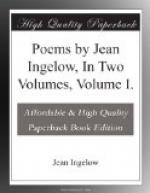A WEDDING SONG.
Come up the broad river, the Thames, my Dane,
My Dane with the beautiful
eyes!
Thousands and thousands await thee full fain,
And talk of the wind and the
skies.
Fear not from folk and from country to part,
O, I swear it is wisely done:
For (I said) I will bear me by thee, sweetheart,
As becometh my father’s
son.
Great London was shouting as I went down.
“She is worthy,”
I said, “of this;
What shall I give who have promised a crown?
O, first I will give her a
kiss.”
So I kissed her and brought her, my Dane, my Dane,
Through the waving wonderful
crowd:
Thousands and thousands, they shouted amain,
Like mighty thunders and loud.
And they said, “He is young, the lad we love,
The heir of the Isles is young:
How we deem of his mother, and one gone above,
Can neither be said nor sung.
“He brings us a pledge—he will do
his part
With the best of his race
and name;”—
And I will, for I look to live, sweetheart,
As may suit with my mother’s
fame.
THE FOUR BRIDGES.
I love this gray old church, the low, long nave,
The ivied chancel and the
slender spire;
No less its shadow on each heaving grave,
With growing osier bound,
or living brier;
I love those yew-tree trunks, where stand arrayed
So many deep-cut names of youth and maid.
A simple custom this—I love it well—
A carved betrothal and a pledge
of truth;
How many an eve, their linked names to spell,
Beneath the yew-trees sat
our village youth!
When work was over, and the new-cut hay
Sent wafts of balm from meadows where it lay.
Ah! many an eve, while I was yet a boy,
Some village hind has beckoned
me aside,
And sought mine aid, with shy and awkward joy,
To carve the letters of his
rustic bride,
And make them clear to read as graven stone,
Deep in the yew-tree’s trunk beside his own.
For none could carve like me, and here they stand.
Fathers and mothers of this
present race:
And underscored by some less practised hand,
That fain the story of its
line would trace,
With children’s names, and number, and the day
When any called to God have passed away.
I look upon them, and I turn aside,
As oft when carving them I
did erewhile;
And there I see those wooden bridges wide
That cross the marshy hollow;
there the stile
In reeds embedded, and the swelling down,
And the white road towards the distant town.
But those old bridges claim another look.
Our brattling river tumbles
through the one;
The second spans a shallow, weedy brook;
Beneath the others, and beneath
the sun,
Lie two long stilly pools, and on their breasts
Picture their wooden piles, encased in swallows’
nests.




